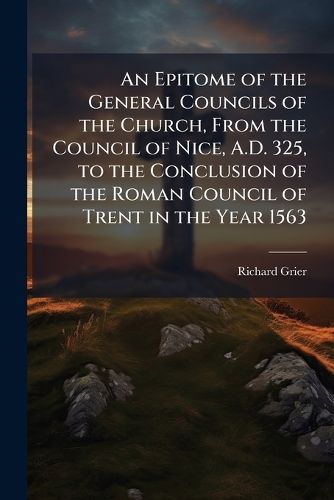Readings Newsletter
Become a Readings Member to make your shopping experience even easier.
Sign in or sign up for free!
You’re not far away from qualifying for FREE standard shipping within Australia
You’ve qualified for FREE standard shipping within Australia
The cart is loading…






"An Epitome of the General Councils of the Church" by Richard Grier offers a comprehensive overview of the major ecumenical councils from the Council of Nice in 325 AD to the Council of Trent, concluded in 1563. This historical account provides invaluable insights into the development of Christian doctrine and the evolution of church governance through pivotal moments in religious history.
Grier's work includes incidental notices of other significant councils and an appendix containing observations on the First Four General Councils. This detailed historical exploration is an essential resource for theologians, historians, and anyone interested in understanding the foundations of Christian thought and the historical context of the Church's most important gatherings.
This work has been selected by scholars as being culturally important, and is part of the knowledge base of civilization as we know it. This work was reproduced from the original artifact, and remains as true to the original work as possible. Therefore, you will see the original copyright references, library stamps (as most of these works have been housed in our most important libraries around the world), and other notations in the work.
This work is in the public domain in the United States of America, and possibly other nations. Within the United States, you may freely copy and distribute this work, as no entity (individual or corporate) has a copyright on the body of the work.
As a reproduction of a historical artifact, this work may contain missing or blurred pages, poor pictures, errant marks, etc. Scholars believe, and we concur, that this work is important enough to be preserved, reproduced, and made generally available to the public. We appreciate your support of the preservation process, and thank you for being an important part of keeping this knowledge alive and relevant.
$9.00 standard shipping within Australia
FREE standard shipping within Australia for orders over $100.00
Express & International shipping calculated at checkout
"An Epitome of the General Councils of the Church" by Richard Grier offers a comprehensive overview of the major ecumenical councils from the Council of Nice in 325 AD to the Council of Trent, concluded in 1563. This historical account provides invaluable insights into the development of Christian doctrine and the evolution of church governance through pivotal moments in religious history.
Grier's work includes incidental notices of other significant councils and an appendix containing observations on the First Four General Councils. This detailed historical exploration is an essential resource for theologians, historians, and anyone interested in understanding the foundations of Christian thought and the historical context of the Church's most important gatherings.
This work has been selected by scholars as being culturally important, and is part of the knowledge base of civilization as we know it. This work was reproduced from the original artifact, and remains as true to the original work as possible. Therefore, you will see the original copyright references, library stamps (as most of these works have been housed in our most important libraries around the world), and other notations in the work.
This work is in the public domain in the United States of America, and possibly other nations. Within the United States, you may freely copy and distribute this work, as no entity (individual or corporate) has a copyright on the body of the work.
As a reproduction of a historical artifact, this work may contain missing or blurred pages, poor pictures, errant marks, etc. Scholars believe, and we concur, that this work is important enough to be preserved, reproduced, and made generally available to the public. We appreciate your support of the preservation process, and thank you for being an important part of keeping this knowledge alive and relevant.